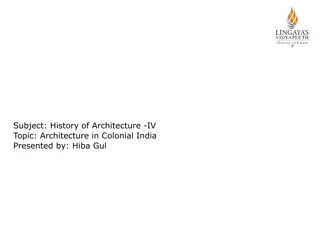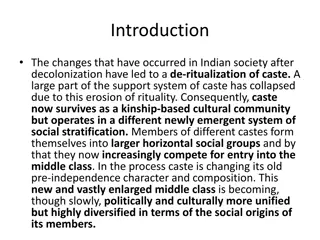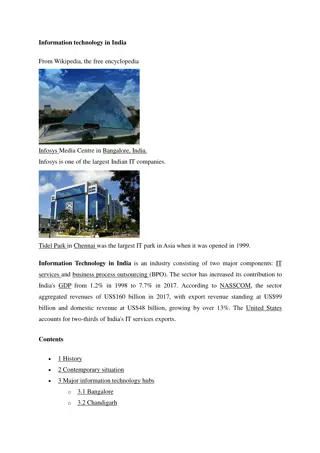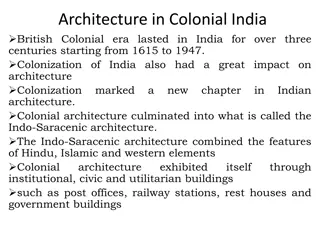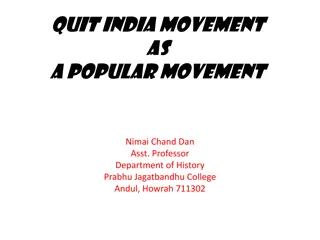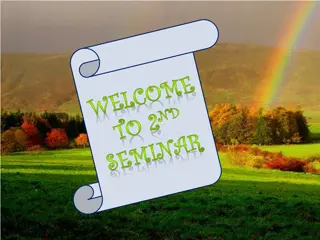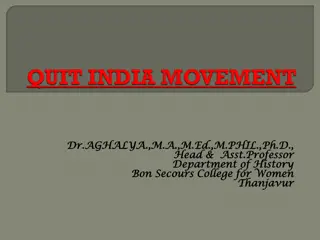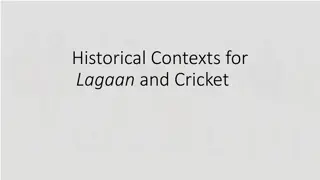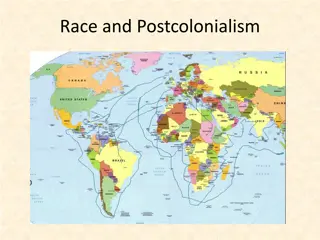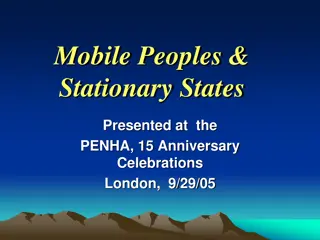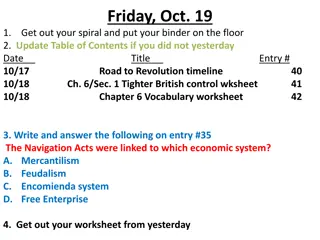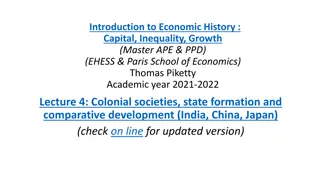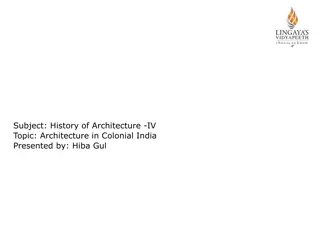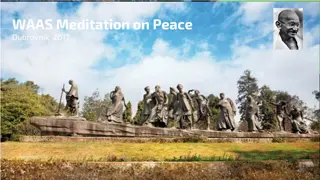The Shifting of India's Capital: The Story of New Delhi
The decision to move the capital of India from Calcutta to Delhi in 1911 led to the creation of Imperial Delhi, now known as New Delhi. This move was a reflection of British colonial rule in India, marked by controversies, cost overruns, and disagreements among architects. The shift was influenced b
1 views • 19 slides
Top Heart Hospitals in India for heart treatment
India has many top heart hospitals in the world that are renowned for their advanced cardiac care, world-class facilities, and best heart treatments. These hospitals have highly skilled and best cardiologists in India with the latest technology. Dr. Naresh Trehan is the best cardiologist in India. S
4 views • 2 slides
State Bank of India
State Bank of India (SBI) is one of the largest and pioneer public sector banks in India. It was established in 1806 as the Bank of Calcutta, making it one of the oldest commercial banks in the Indian subcontinent. It later merged with the Bank of Bombay and the Bank of Madras in 1921 to form the Im
4 views • 5 slides
Discover the Rich Culture and Diverse Landscapes of India
India, officially known as the Republic of India, is a diverse and culturally rich country located in South Asia. With vibrant traditions, a rich history, and stunning landscapes, India offers a mesmerizing experience for travelers. From the majestic forts and palaces of Jaipur to the spiritual ritu
3 views • 17 slides
Colonial Acts and Conflicts in American History
Key historical events such as the French & Indian War, the Proclamation of 1763, and the Quartering Act are explored, shedding light on critical laws, conflicts, and tensions that shaped colonial America. The discussion covers acts imposed by the British government, the impact on settlers and Native
5 views • 15 slides
Union Bank of India
Union Bank of India was established on November 11, 1919, as a limited company with its headquarters located in Mumbai. Union Bank of India stands as a prominent public sector bank, with 76.99 percent of its total share capital held by the Government of India.\nOrganisation of Union Bank of India\nU
1 views • 5 slides
Post Matric Scholarship for OBC Students – Puducherry
How to get Post Matric Scholarship for Obc in Puducherry\n\nThe Post Matric Scholarship for OBC Students in Puducherry for the academic year, offered by the Ministry of Social Justice & Empowerment, Government of India, is an opportunity for students in the OBC category to pursue post-matric educati
1 views • 5 slides
Architecture in Colonial India: A Blend of Cultures
British Colonial architecture in India during the 17th to 20th centuries combined Hindu, Islamic, and Western elements, leading to the unique Indo-Saracenic style. This architectural era saw the construction of institutional and civic buildings showcasing a mix of Gothic, Neo-Classical, Indo-Islamic
0 views • 9 slides
Exploring "A Passage to India" Through Forster's Novel
The novel "A Passage to India" by E.M. Forster delves into the darker aspects of globalization and colonialism, contrasting Whitman's optimistic view. It follows characters caught in racial tensions amidst British colonial rule in India, questioning motives behind exploration and empire-building. Th
1 views • 9 slides
Evolution of Medicine in Colonial South Asia
The evolution of medicine in colonial South Asia witnessed a transition from local traditional practices to the dominance of imported European medicine. This shift, marked by the establishment of imperial institutions and training of local physicians in Western techniques, led to a complex interplay
1 views • 5 slides
Language Controversy and Political Awakening in Colonial India
Urdu-Hindi language controversy in colonial India sparked a significant cultural and political divide between Hindus and Muslims, leading to the emergence of the Two-Nation Theory. This controversy, along with events like the formation of the Indian National Conference, highlighted growing tensions
0 views • 45 slides
European Advent in India: Colonial Rule and Trade Rivalry
Commercial contacts between India and Europe have a long history, with Europeans initially arriving as traders but eventually establishing colonies due to political and commercial rivalries. The Portuguese, Dutch, and English all played significant roles in shaping India's history through their trad
1 views • 18 slides
Evolution of Caste in Post-Colonial Indian Society
Changes in Indian society post decolonization have led to the de-ritualization of caste, resulting in a shift towards a kinship-based cultural community operating in a new system of social stratification. Secularization of caste has detached it from ritual hierarchy and aligned it with competitive d
5 views • 10 slides
Sex Work Laws in India: Past, Present, and Perspectives
Prostitution in India has a complex history, from early colonial times to present-day legal ambiguities. This article explores the definitions, causes, and legal status of prostitution in India, shedding light on related professions and activities punishable under law.
0 views • 16 slides
Understanding Uganda's Pre-Colonial History through Major Sam Emoit's Presentation
Delve into the pre-colonial history of Uganda as presented by Major Sam Emoit, Chief Instructor at the School of Military Intelligence and Security. Explore the way ancestral Ugandan communities lived, their tools, social patterns, and interactions before colonial rule. Discover the diverse methods
0 views • 127 slides
Information Technology in India: A Comprehensive Overview
Information Technology in India has seen significant growth, with key contributions from companies like Infosys and the establishment of major IT hubs like Bangalore and Chennai. The industry, comprising IT services and BPO, has significantly boosted India's GDP over the years, with a notable increa
2 views • 6 slides
Evolution of Colonial Architecture in British India
The British Colonial era in India spanned over three centuries from 1615 to 1947, leaving a lasting impact on the country's architecture. The fusion of Hindu, Islamic, and Western elements gave rise to the distinctive Indo-Saracenic style, showcased in various institutional and civic structures. Exp
0 views • 16 slides
Overview of Quit India Movement and its Phases
The Quit India Movement was a significant event in India's struggle for independence, marked by various factors leading to its emergence, including the demise of the Civil Disobedience Movement and the rise of nationalist sentiments. The movement escalated in response to the outbreak of World War II
1 views • 9 slides
Welcome to Colonial Cafe Orientation
Explore the comprehensive orientation agenda at Colonial Cafe, covering essential topics such as company history, mission, job expectations, benefits, and training. Learn about the Cherry System, growth opportunities, and the company's commitment to providing excellent service and quality food. Get
0 views • 28 slides
American Colonial History and Representative Government Study Guide
Study guide for American colonial history and representative government covering topics such as Colonial Culture, the Great Awakening/Enlightenment, Ben Franklin, and Roots of Representative Government including Magna Carta, Parliament, English Bill of Rights, Glorious Revolution, salutary neglect,
0 views • 4 slides
Colonial Culture and The Great Awakening: Overview and Impact
This content covers activities and notes related to Colonial Culture, Native Americans, Colonists, and the African American community. It also delves into the Great Awakening and Enlightenment period, discussing the religious movement in the 1730s-1740s. Traveling ministers, such as Jonathan Edwards
0 views • 13 slides
Evolution of Agricultural Extension Services in India
Agricultural extension in India has evolved through four generations, from colonial agriculture to diverse top-down and unified top-down extension approaches. The system has adapted to meet the needs of the farming community, with a focus on scientific research, knowledge application, and farmer edu
3 views • 55 slides
The Quit India Movement: A Pivotal Moment in India's Independence Struggle
The Quit India Movement, also known as the India August Movement, was a key event in India's fight for independence led by Mahatma Gandhi in 1942. This movement urged the British to grant India independence through peaceful non-violent protests. It called for an immediate end to British rule, the fo
0 views • 15 slides
Unveiling Historical Contexts of Lagaan and Cricket in Colonial India
Explore the intricate historical contexts of the film "Lagaan" and the sport of cricket in colonial India. Delve into the political history, princely India dynamics, class, caste, region, religion complexities, and the economic significance in the British Empire's rule. Unveil the interplay of racis
0 views • 6 slides
Post Harvest Methods in Cucurbits - Importance and Techniques
Different types of fruits and vegetables are grown in India due to varied agro-climatic conditions. India, being the second largest producer globally, faces significant post-harvest losses. Improper management practices such as careless harvesting, inadequate storage facilities, and processing metho
0 views • 39 slides
European Colonial Encounters 1750-1914: Paths to Imperialism
Second wave European conquests in the 18th and 19th centuries saw a shift towards informal control and military force in establishing empires in Africa and Asia. Various paths to colonial status emerged in India, Indonesia, Australia, and New Zealand, reflecting different colonization methods and ou
0 views • 21 slides
The Crisis Begins: Impact of the Stamp Act and Colonial Resistance
The Crisis Begins Chapter from "Give Me Liberty!" discusses the repercussions of the 7 Years War and the end of salutary neglect, leading to new trade regulations and increased taxation on colonists. The imposition of the Stamp Act without colonial consent sparked widespread resistance, with the eme
0 views • 14 slides
Understanding Postcolonialism and Its Impact on Literature Studies
Postcolonial theory delves into the influence of colonialism on literature and academia, emphasizing the shift in national identities post-colonization. This theory examines the dynamics of power, resistance, and cultural dominance in the context of British colonial history, highlighting the reactio
0 views • 19 slides
Post-Colonial Struggles and African Literature Representation in Zimbabwe
In Zimbabwe, the complexities of Ndebele-Shona history, the repercussions of Gukurahundi massacres, and the challenges of post-colonial state-building intersect with the portrayal of Africa in Western literature. Scholars like Sabelo Ndlovu-Gatsheni and Sarah Brouillette critique how Zimbabwean expe
0 views • 12 slides
European Colonial Competition in East Africa
The division of African territories by European powers, such as Britain, France, and Italy, led to conflicts and negotiations in the Horn of Africa. Menelik, an African leader, challenged European colonialists, resulting in the famous Battle of Adwa. The aftermath of the battle saw a shift towards n
0 views • 25 slides
Colonial Rebellions and Reactions in Early America
The Colonial Rebellions in early America, such as Bacon's Rebellion and the Stono Rebellion, exemplified the growing tensions and conflicts within the colonial society. These uprisings highlighted issues of class struggle, disparity in social status, and led to significant consequences such as the f
0 views • 7 slides
The Remarkable Journey of Robert Clive: From Clerk to Governor in Colonial India
Robert Clive, known for his military prowess and statesmanship, rose from a humble clerk to a significant figure in the British East India Company. His strategic victories in battles like Arcot, Plassey, and Buxar shaped British colonial rule in India. As a statesman, he implemented civil reforms an
0 views • 4 slides
Colonial Challenges Under British Rule
In this academic material, students are instructed to update the Table of Contents and engage with resources related to tighter British control over the colonies. The tasks include exploring historical events like the Proclamation Act of 1763, Quartering Act, Sugar Act, Stamp Act, Declaratory Act, a
0 views • 18 slides
Colonial Societies and State Formation in Comparative Development
The lecture explores the impact of colonialism on societies in India, China, and Japan, focusing on state formation, caste systems, and post-independence dynamics. It discusses the role of slavery, colonial domination, and fiscal-military states in the rise of Europe and the industrial revolution, h
0 views • 40 slides
Sustainable Post-Harvest Practices in Rural India
In a sub-tropical region of India, the need for solar energy in agricultural practices, particularly post-harvest management of fruits and vegetables, is highlighted. Emphasis is placed on minimizing post-harvest losses through proper handling, transportation, and storage techniques. Various aspects
0 views • 11 slides
Colonial India's Architectural Marvels: Senate House and Victoria Memorial Hall
Discover the architectural beauty of Colonial India through two iconic monuments - Senate House at the University of Madras and Victoria Memorial Hall in Calcutta. Designed by renowned architects of the 19th century, these structures showcase a blend of Indo-Saracenic and classical styles, highlight
0 views • 10 slides
The Inspiring Story of Gandhi's 1930 Salt March in India
Gandhi's 1930 Salt March in India was a powerful act of nonviolent resistance against British colonial rule. By defying the salt tax, Gandhi united millions of Indians and inspired a wave of civil disobedience that ultimately led to India's independence. This iconic event not only symbolized India's
0 views • 9 slides
Exploring Anthropology of Art: Perspectives and Studies on Cultural Expressions
This text delves into the intersection of anthropology and art, focusing on the importance of anthropological approaches in studying artistic subjects. It covers various topics such as the nature of art, methodologies, theoretical frameworks, and case studies. The discussed themes include the role o
0 views • 7 slides
Cultural Contrasts in Colonial Texas - Anglos vs Mexicans
The cultural differences between Anglos and Mexicans in Colonial Texas were evident through contrasting perspectives on power structures, military involvement, slavery, and governance. Anglos advocated for civilian rule and believed in the military serving the people, while Mexicans emphasized power
0 views • 6 slides
Political Cleavages in Post-Colonial Societies: Social-Nativism vs. Social-Federalism
This lecture explores the shifting political cleavages in post-colonial societies, focusing on the rise of social-nativism and social-federalism. It examines the reversal of the education cleavage in Western democracies, the emergence of social-nativism in post-communist Eastern Europe, and the chan
0 views • 30 slides







